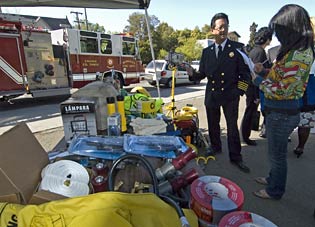UC Berkeley Web Feature
Greek houses, co-ops gain access to emergency supply caches, disaster training
BERKELEY – Amid new reports that the Hayward Fault is due for a major earthquake, UC Berkeley students and campus and city officials today (Thursday, March 20) announced the launch of a first-in-the-nation student disaster-preparedness program.
 Berkeley Deputy Fire Chief Gil Dong displays the contents of a disaster supply cache at a campus press conference Thursday. (Steve McConnell/NewsCenter photo) |
Through an $18,000 federal grant to the city of Berkeley's fire department, the more than 2,500 UC Berkeley students who live in fraternities, sororities and cooperative housing will receive six caches of emergency supplies as well as training so they can be equipped to respond to major earthquakes or other natural catastrophes.
Each of the six storage containers will contain an electrical generator, helmets and goggles, fire extinguishers, portable lights, two-way radios and other first aid and rescue equipment. Five of the caches will be spread among 50 fraternity and sorority houses on the south side of the campus, and one will be kept at a co-op on the north side, one of 20 properties around the UC Berkeley campus overseen by the University Students' Cooperative Association. Under the student disaster-response program, 10 percent of all fraternity, sorority and co-op residents will be required to complete some aspect of emergency training.
"We are doing something that has never been done before in this nation, which is to change the culture of our students when it comes to disaster preparedness," said Berkeley Deputy Fire Chief Gil Dong at a news conference Thursday at UC Berkeley.
In the event of a major earthquake, it would take three to seven days for federal aid to reach Berkeley, said Grahaeme A. Hesp, UC Berkeley's director of fraternity and sorority life for the Center for Student Leadership. "Through this partnership, we are truly reaching out to improve the life safety of our students," Hesp said.
Many of UC Berkeley's 66 fraternity and sorority buildings were erected long before California instituted earthquake safety building codes in the 1960s. Indeed, the Zeta Psi Fraternity opened in 1870 and the Kappa Kappa Gamma sorority opened in 1880.
Unlike the city's more established neighborhoods, of which more than three dozen already have received emergency caches and training, UC Berkeley's student population is largely transitory. UC Berkeley's fraternity and sorority community, however, is both densely populated and close-knit and can serve as a model for disaster-response preparedness, Hesp said.
"We hope that, in this way, UC Berkeley can lay groundwork for other universities to empower their students in times of disaster," said Kenan Wang, former president of UC Berkeley's Inter-Fraternity Council, which governs 35 of UC Berkeley's fraternities.
Another partner in this disaster-response project is the Bay Area chapter of the American Red Cross, which has set a goal to train 1 million Bay Area residents free of charge in the next year in fire suppression, search and rescue, first-aid and radio communications.

